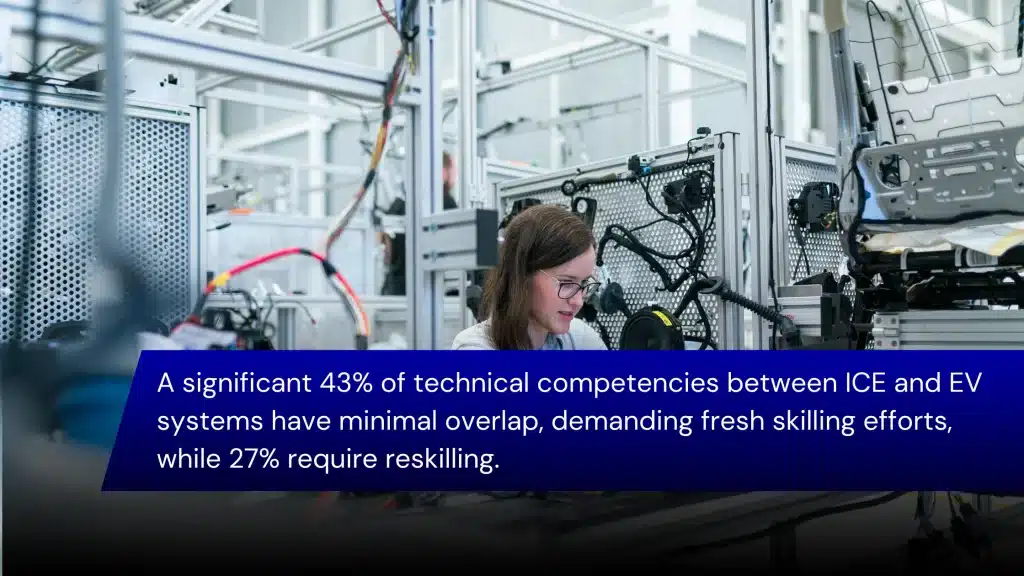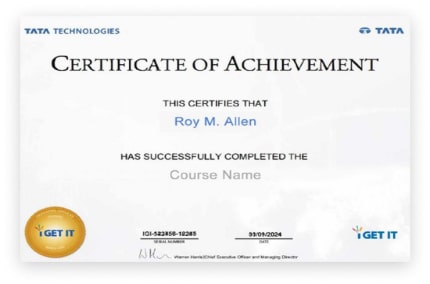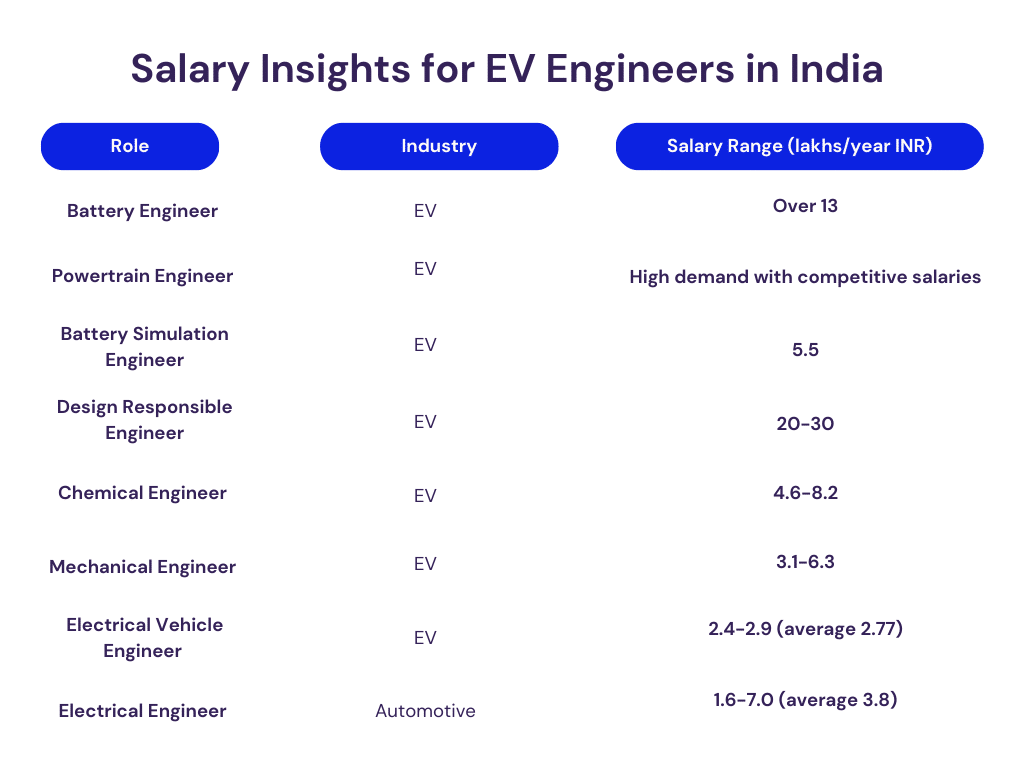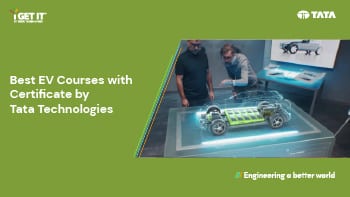Best EV Online Courses with Certification by Tata Technologies
January 22, 2025 2025-01-24 18:06Best EV Online Courses with Certification by Tata Technologies
Best EV Online Courses with Certification by Tata Technologies
As the EV industry continues to expand, specialized training in EV engineering becomes essential for those looking to capitalize on this booming sector. The Electric Vehicle (EV) courses by Tata Technologies stands out as a prime example of such specialized training, equipping future engineers with the knowledge and skills necessary to excel in the EV sector. This blog will delve into the specifics of the top-rated EV courses online with certificate , explore the promising future of the EV industry, and provide insights into the lucrative salaries and career growth opportunities for specialized EV professionals.
Table of Contents
Growing Need of Upskilling in the EV Sector
The Electric Vehicle (EV) industry is experiencing unprecedented growth, transforming the automotive landscape at a rapid pace. Nations worldwide are prioritizing sustainable transportation, leading to a surge in EV adoption. With global EV sales expected to reach 45 million units annually by 2040, the demand for skilled professionals who can drive this green revolution forward is higher than ever. The transition from internal combustion engines to electric powertrains is not just a technological shift but a monumental change in the skills required to design, build, and maintain these vehicles.

Best EV Certification Courses by Tata Technologies
Here are the top-rated online EV certification courses:
1. EV Essentials Course:
The EV Essentials course serves as an entry point into the world of electric mobility. It covers the basics and core elements of electric vehicles, including the principles of electric powertrains, key components of EVs, and the environmental impact of electric transportation. This foundational course is designed to provide a solid understanding of the EV landscape, empowering students to navigate the electric revolution with expertise and flair.
2. Energy Storage Course:
This course focuses on the fundamentals of EV energy storage systems. It delves into the principles of energy storage, types of batteries used in EVs, and the science behind battery efficiency and performance. By uncovering the secrets of efficient energy storage, this course empowers learners to drive the future of sustainable electric mobility, ensuring they have the knowledge to work with cutting-edge energy storage technologies.
3. Battery Pack Design:
The Battery Pack Design course takes a deeper dive into the design and development of battery packs. It covers topics such as battery pack architecture, thermal management, safety considerations, and performance optimization. This course is aimed at equipping students with the skills needed to create efficient, high-performance battery packs, positioning them at the forefront of sustainable transportation design.
4. Battery Management System:
The Battery Management System (BMS) course is designed for those looking to master the intricacies of battery management. It covers advanced topics such as single-cell algorithms, state-of-charge estimation, battery health monitoring, and innovative energy systems. This course prepares students to excel in battery management, propelling their careers into the forefront of innovative energy systems.
5. Thermal Management System in EV:
The Thermal Management System in EV course focuses on the critical role of temperature regulation in electric vehicles. It explores topics such as thermal control strategies, cooling systems for battery packs, and HVAC integration for EVs. Learners will gain insights into optimizing thermal performance to enhance battery lifespan, safety, and overall vehicle efficiency, ensuring they are prepared to tackle the challenges of thermal dynamics in electric mobility.
6. High Voltage Systems in EV:
The High Voltage Systems in EV course delves into the complexities of high-voltage architecture and safety protocols. It covers key areas such as high-voltage power distribution, insulation techniques, fault management, and maintenance practices. This advanced course equips engineers with the expertise needed to design, implement, and manage high-voltage systems, solidifying their role as specialists in the EV domain.

Future Prospects in the EV Industry
The future of the EV industry is exceptionally bright, driven by a combination of technological advancements, regulatory support, and increasing consumer demand for sustainable transportation. Governments worldwide are implementing policies to reduce carbon emissions, which includes incentives for EV adoption and investments in charging infrastructure. For instance, countries like Norway and the Netherlands are leading the charge with ambitious targets to phase out internal combustion engine vehicles by 2025 and 2030, respectively.
Technological innovations in battery technology, power electronics, and autonomous driving are further accelerating the growth of the EV market. Companies are investing heavily in research and development to enhance battery efficiency, reduce costs, and increase vehicle range. The shift towards EVs is also opening new business models such as electric car-sharing services and battery recycling industries.
High Salaries and Career Growth in the EV Industry
As the EV industry grows, so does the demand for skilled professionals who can design, develop, and manage electric vehicles and their components. This demand translates into lucrative salary packages and substantial career growth opportunities for those with specialized skills in EV technology. According to Salary Expert, battery engineers, who play a critical role in developing and optimizing battery systems, can earn over ₹13 lakhs per year in India. Powertrain engineers, who focus on the design and integration of electric drivetrains, are also in high demand with competitive salaries.
Battery simulation engineers, responsible for modeling and simulating battery performance, have an average salary of ₹5.5 lakhs per year . According to Ambition Box data, Design Responsible Engineers (DREs), who oversee the design, development, validation, and integration of EV subsystems like motors, batteries, and power converters, can earn between ₹20-30 lakhs annually . Chemical engineers, who work on formulating chemical solutions to enhance EV efficiency, earn around ₹4.6-8.2 lakhs per year, while mechanical engineers, who integrate the mechanical components of EVs, earn between ₹3.1-6.3 lakhs per year .

What is the Average Salary for EV Engineers in India?
Below is the average salary for EV engineers in India basis on different roles and positions:
1. Battery Engineers: With expertise in batteries, Battery Management Systems (BMS), and battery pack integration, battery engineers are among the highest-paid professionals in the EV industry. Their salaries can exceed ₹13 lakhs per year, reflecting the critical role they play in the development and optimization of battery systems.
2. Powertrain Engineers: Powertrain engineers, who design and develop electric drivetrains, are also well-compensated. Their deep understanding of electric motors, power electronics, and drivetrain integration makes them invaluable to EV manufacturers.
3. Battery Simulation Engineers: Battery simulation engineers use advanced modeling and simulation tools to predict battery performance under various conditions. Their average salary in India is ₹5.5 lakhs per year, highlighting the importance of their work in ensuring the reliability and efficiency of battery systems.
4. Design Responsible Engineers: DREs are responsible for the complete design and development of EV subsystems. Their extensive responsibilities and critical role in the integration of complex systems are rewarded with salaries ranging from ₹20-30 lakhs annually.
5. Chemical Engineers: Chemical engineers in the EV industry work on developing and optimizing battery chemistry and materials. Their expertise is crucial for improving battery performance and longevity, earning them salaries between ₹4.6-8.2 lakhs per year.
6. Mechanical Engineers: Mechanical engineers involved in EV design and integration work on various components such as wire harnesses, engines, and fuel systems. Their salaries range from ₹3.1-6.3 lakhs per year, depending on their level of experience and specialization.

Comparison with Other Engineering Roles
When compared to other engineering roles in the automotive industry, EV engineers generally command higher salaries due to the specialized skills and knowledge required in this field. For example, electrical engineers in the automobile industry in India have an average annual salary of around ₹3.8 lakhs, ranging from ₹1.6 lakhs to ₹7.0 lakhs. In contrast, the average salary for an Electric Vehicle Engineer is around ₹2.77 lakhs per year, typically ranging from ₹2.4 lakhs to ₹2.9 lakhs . However, for specialized roles like battery engineers and DREs, the salary is significantly higher.
This premium pay reflects the growing demand for specialized EV skills as the industry rapidly evolves. While entry-level and mid-career EV engineers enjoy a salary premium compared to their counterparts in traditional automotive roles, the gap narrows as they progress to senior leadership positions. At the VP level with over 30 years of experience, the pay is almost the same between EV and traditional automotive roles, around ₹70-100 lakhs per year in India.
Final Thoughts
In conclusion, the EV industry is experiencing rapid growth, creating numerous opportunities for skilled professionals. Specialized EV courses, such as the i GET IT EV-Battery Certification Program, are essential for those looking to capitalize on this booming sector. These courses provide the knowledge and skills needed to excel in the EV industry, ensuring high salary potential and promising career growth.
If you are an aspiring EV professional looking to accelerate your career, explore the i GET IT EV-Battery Certification Program today. Equip yourself with the expertise needed to thrive in the future of electric mobility and position yourself as a valuable asset in the EV industry.
Saurabh Deshpande
Related Posts
Most Common GD&T Interview Questions & Answers [Expert’s List]
i GET IT By Tata Technologies: Empowering Engineering Education
Top 35 Electric Vehicle Engineer Interview Questions & Answers
Find
Categories
Latest Posts
Popular Tags











![PLM Teamcenter Interview Questions and Answers – [HR Expert List]](https://igetitv2ww-dev.myigetit.com/wp-content/uploads/2025/02/blog-350-x-197-px-100x80.webp)



